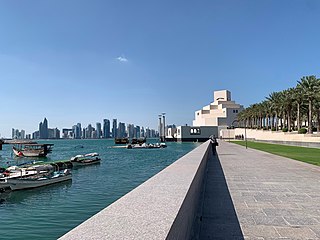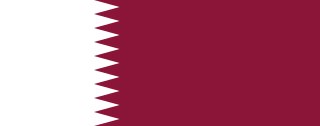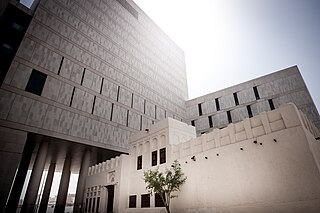Related Research Articles

The Qatar Armed Forces are the military forces of the State of Qatar. Since 2015, Qatar has implemented mandatory military conscription with an average of 2,000 graduates per year. As of 2010, Qatar's defence expenditures added up to a total of $1.913 billion, about 1.5% of the national GDP, according to the SIPRI. Qatar has recently signed defence pacts with the United States in 2002 & 2013, with the United Kingdom in 2020, and with France in 1994.

The Museum of Islamic Art (MIA) is a museum on one end of the seven-kilometer-long (4.3 mi) Corniche in Doha, Qatar. As per the architect I. M. Pei's specifications, the museum is built on an island off an artificial projecting peninsula near the traditional dhow harbor. A purpose-built park surrounds the edifice on the eastern and southern facades while two bridges connect the southern front facade of the property with the main peninsula that holds the park. The western and northern facades are marked by the harbor showcasing the Qatari seafaring past. In September 2017, Qatar Museums appointed Julia Gonnella as new director of MIA. In November 2022 the MIA became the first carbon-neutral certified museum in the Middle East Region. The museum participates in the Expo 2023 Doha from October 2023 until March 2024, with workshops and events focusing on biodiversity and sustainability.

Katara Cultural Village, also called Katara, is a cultural and commercial complex in Doha, Qatar, located on the eastern coast between West Bay and the Pearl.

Mathaf: Arab Museum of Modern Art is a museum in Doha, Qatar with over 9,000 objects. Established in 2010, it is considered a major cultural attraction in the country.

Doha Film Institute (DFI) is a nonprofit cultural organisation established in 2010 by Sheikha Al-Mayassa bint Hamad bin Khalifa Al-Thani to support the growth of the Qatari film community and to provide funding and international networking opportunities to creators. DFI hosts two major film festivals, Ajyal Film Festival and Qumra, each year. Since its inception, DFI has financially supported more than 600 projects from development through post-production.

Qatar Museums is a Qatari government entity that oversees the Museum of Islamic Art (MIA), Mathaf: Arab Museum of Modern Art, MIA Park, QM Gallery at the Katara Cultural Village, ALRIWAQ DOHA Exhibition Space, the Al Zubarah World Heritage Site Visitor Centre, and archaeological projects throughout Qatar, as well as the development of future projects and museums that will highlight its collections across multiple areas of activity including Orientalist art, photography, sports, children's education, and wildlife conservation.

Qatar National Library (QNL) is a non-profit organization under the umbrella of the Qatar Foundation for Education, Science and Community Development. The plans for the new national library were announced by Sheikha Moza bint Nasser, Chairperson of Qatar Foundation, on 19 November 2012, during a ceremony celebrating the 50th anniversary of the Dar Al Kutub Library, in Doha, Qatar, one of the first public libraries in the Persian Gulf region, which had until then been regarded as the national library of Qatar.
The Qatar Museums (QM) Public Art Department is responsible for overseeing the installation of artwork by renowned artists in the public realm in Qatar, creating an artist residency program for young local artists to help them develop their skills and horizons, organizing exhibitions featuring international artists and developing an online community of creative talent in Qatar and beyond. The QM has an ambitious plan that aims to make Qatar a world class cultural destination, notably in modern and contemporary art.

The mass media in Qatar relays information and data in Qatar by means of television, radio, cinema, newspapers, magazines and the internet. Qatar has established itself as a leading regional figure in mass media over the past decade. Al Jazeera, a global news network which was established in 1996, has become the foundation of the media sector. The country uses media to brand itself and raise its international profile.

The National Museum of Qatar is a national museum in Doha, Qatar. The current building opened to the public on 28 March 2019, replacing the previous building which opened in 1975. The building was designed by architect Jean Nouvel who was inspired by the desert rose crystal, which can be found in Qatar. The museum site includes Sheikh Abdullah bin Jassim Al Thani's Palace, which is the heart of the Qatari national identity. As of 2013, the director of the museum is Sheikha Amna.

The modern Qatari art movement emerged in the mid-20th century, as a result of the new-found wealth acquired from oil exports and the subsequent modernization of Qatari society. Because of Islam's non-inclusive stance of depictions of sentient beings in visual arts, paintings historically played an insignificant role in the country's culture. Other visual art forms such as calligraphy, architecture, and textiles were more highly regarded in the Bedouin tradition.
Wafika Sultan Al-Essa is a Qatari artist specializing in painting and plastic arts. She has occupied posts in Qatar TV's production department. She is one of the first females in the country to study and practice art professionally. She has been described as a pioneer of modern art in Qatar.
Hassan Al Mulla is a Qatari artist specializing in paintings. He has been described as a "pioneer in painting in Qatar".

Sheikh Faisal Bin Qassim Al Thani Museum is a privately owned museum located in the municipality of Al-Shahaniya in Qatar. Encompassing an area of 530,000 m2, the three-building museum was opened in 1998 by Sheikh Faisal bin Qassim Al Thani.

Msheireb Museums is a project by Msheireb Properties which celebrates the histories of four historic heritage houses in the heart of Msheireb Downtown Doha, a planned city in the Qatari capital Doha.
Ahmed Albahrani, is an Iraqi painter and sculptor. He is one of the most famous Iraqi artists now living between Sweden and Qatar, known for his public large-scale artworks.

China – Qatar relations are the bilateral relations between the People's Republic of China and the State of Qatar. China has an embassy in Doha, while Qatar has an embassy in Beijing. With diplomatic relations first formed in 1988, Qatar is a strategic ally of China, and the two countries maintain a strong relationship.

Cinema in Qatar is a relatively young industry that evolved as part of the country’s plans to develop different local sectors with the aim of accumulating international recognition and status. Many major steps were taken to implement a long-term plan to develop the infrastructure as well as giving opportunities to local talents to have a platform that establishes their presence within the film industry with the support of the Doha Film Institute, and their various grants, workshops and festivals. The Qatar National Vision 2030 has three major pillars to development: human, social economic and environmental; this vision provides frameworks that enable the development of different elements within Qatar and its society; one of which is the high importance put on developing and cultivating artistic talents to represent and define Qatar on a global scale. Another important element in developing the movie industry is the influence and vision of Sheikha Al Mayassa who founded Doha Film Institution; the establishment of film as a mode of storytelling was imperative because it serves the purpose of granting Qatar a global presence through the talents that are supported and cultivated because of her initiative. The film industry plays a role in amplifying the Qatari national identity alongside the identity of the Arab world as a whole.
Events in the year 2021 in Qatar.
The Fire Station in Doha, Qatar, is a former base for the Qatari Civil Defense Authority repurposed for the Artists in Residence programme of the Qatar Museums. Khalifa Al Obaidli is the director and Saida Al Khulaifi is the head of programmes and exhibitions. On 4 April 2023, the Fire Station held its first public event for Garangao night which was open to people of all ages.
References
- ↑ "Qatar Year of Culture announces Jedariart, Portland initiative to bring Qatari artists, mural art to the US". ILoveQatar.net. Retrieved 2023-08-04.
- ↑ "JEDARIART: Meet the Artists – Part One". Qatar Museums. Retrieved 2023-08-04.
- ↑ "Where to find all the Jedariart murals in Doha". TimeOut Doha. Retrieved 2023-08-04.
- ↑ "QM invites artists to participate in second edition of Jedariart". Gulf Times. 2022-05-06. Retrieved 2023-08-04.
- ↑ "'JEDARIART' goes to US, Qatari artists paint murals in 5 cities". thepeninsulaqatar.com. 2021-12-19. Retrieved 2023-08-04.
- ↑ "QM's Jedariart programme sees Qatari artists painting murals in US cities". Gulf Times. 2021-12-15. Retrieved 2023-08-04.
- ↑ "Translating Culture Through the Faces of Qatar (Published 2021)". 2021-11-28. Retrieved 2023-08-04.
- ↑ "JedariArt murals are coming to Al Mansoura metro station". TimeOut Doha. Retrieved 2023-08-04.
- ↑ "Truck Art Joins JedariArt in its Latest Version". Scale. 2022-10-27. Retrieved 2023-08-04.
- ↑ "Supervisory panel for beautification holds Alwaan activity for students". Gulf Times. 2022-10-14. Retrieved 2023-08-04.
- ↑ "Artists from India & Pakistan to paint Qatar's city walls in celebration of truck art". ILoveQatar.net. Retrieved 2023-08-04.
- ↑ "JedariArt covers Arabian Village at Hilton Salwa Beach Resort & Villas". Gulf Times. 2022-11-01. Retrieved 2023-08-04.
- ↑ "Applications open for JedariArt programme". thepeninsulaqatar.com. 2023-03-25. Retrieved 2023-08-04.
- ↑ "Qatar Museums seeks public art open call proposals from artists". Qatar Tribune. 2023-04-06. Retrieved 2024-04-11.
- ↑ "Meet the mural artists adding vibrancy to Qatar's cityscape". euronews. 2023-12-18. Retrieved 2024-04-11.